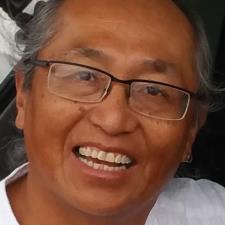
Jim M. answered • 10/03/19
American History Will Come Alive For You!
We called you one of "the civilized tribes," yet we forced marched you from Florida to Oklahoma. What content about your "Trail of Tears" makes up your common folklore?
Shahla A.
asked • 10/02/19
Jim M. answered • 10/03/19
American History Will Come Alive For You!
We called you one of "the civilized tribes," yet we forced marched you from Florida to Oklahoma. What content about your "Trail of Tears" makes up your common folklore?

Jon G. answered • 10/02/19
Patient knowledgeable STEM educator/former healthcare practitioner
Greetings Shahla A. I am Jon and I am a Wyzant tutor. I am here to help you with your question to Wyzant experts.
When I say your question and had a bit of time to think about it, I was wondering about what might be the thoughts you might have considered in addressing this particular question.
I thought that perhaps you were aware, perhaps informed of a bit of the heritage and legacy of the Cherokee people. Perhaps some familial heritage of the Cherokee people. To ask a question like this is to consider what may have been the thoughts or what was going through the minds of there Cherokee leaders and their people, in having to confront the very possibility of the threat to their lives, their families, their children, their future as human beings.
As an educator, what we want to help students with is to think, to problem-solve, to consider ideas and concepts which may not always conform to what knowledge or information students have already been given or developed.
A simple example might be math, certainly in learning how to add is a simple beginning, but as a student progresses in their education, then a student learns to multiply, then progress on to solving linear equations, confronting Geometric proofs, understanding and solving Trig concepts, and perhaps developing skills sets in Calculus. There is this progressing in thinking.
With history, to wonder about the 'what ifs' is an interesting thought to consider.
So with your question, I will offer you some ideas to consider, but it it you who will have to answer the question yourself.
As Native Americas, this is their homelands. These are the lands inhabited by their ancestors. These are the lands they have inhabited for centuries long before 1492. With that said, consider what it would be like if someone came into your home, your house, and told you and your family, what you thought was yours is no longer yours. Someone, with more power and with the assumption that they can come and tell you and your family are in the way, your lives are worthless, and that because of another person's sense of superiority, it is their right to take what was yours, and justify it because their religion gives them authorization to do so, And the most important part of this is that you and your family have no rights, not way to confront their taking of all you have and that you and your family's right to even exist is not recognized.
And if you and your family refuse or try to defend what is yours, it will be seen as a sign of aggression and an act of war, giving them the right to wage war against you and your family.
This is the basic mentality of colonialism. There Cherokee people of the US Southeast were not the only one who have suffered this by those who felt it was their right to do so.
What might you want to ask another their thoughts in dealing with this kind of treatment?
It might be had to even think about this as it might not be able for you to even know what this feels like.
Let's but this in a way that might give you an idea as to how to begin to answer this question. Consider this: Have you ever been bullied? Do you know someone, a friend, a classmate, a teammate, a sibling, a neighbor, who you've seen bullied? I guess I could even ask, have you ever bullied another person? Consider asking the person who was bullied, how they felt? How did they feel being treated this way? Where there others to help? Did anyone come to rescue the bullied person?
Begin this way in trying to answer your problems.
I am here to help. Let me know if you have any other questions, as I said, I am here to help.
Just to let you know, I am Native American. This is the history of all Native Americans of the US.
J
Get a free answer to a quick problem.
Most questions answered within 4 hours.
Choose an expert and meet online. No packages or subscriptions, pay only for the time you need.